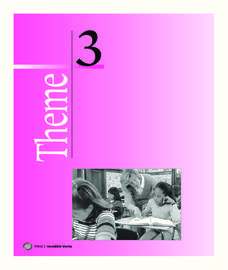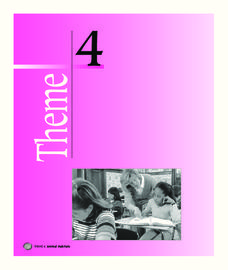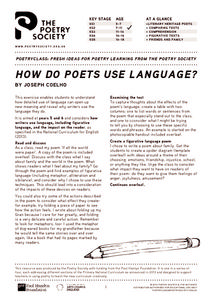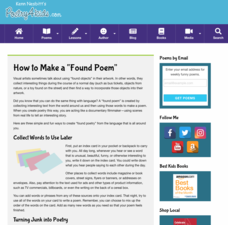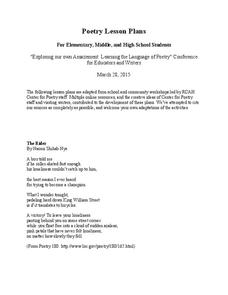Houghton Mifflin Harcourt
Incredible Stories: English Language Development Lessons (Theme 3)
English language learners get extra help understanding the language and concepts in a thematic unit on fantasy and realism from a 40-page packet filled with activities, exercises, and tips.
Houghton Mifflin Harcourt
Smart Solutions: English Language Development Lessons (Theme 6)
Smart Solutions is the theme of a unit created to meet the needs of English language earners. Through a series of lessons, scholars follow a routine—move, speak, and listen— to cover topics including stores, shops, celebrations, pets,...
Poetry4kids
How to Write a Limerick
Add a little fun and fancy to English language arts with an activity that challenges scholars to write a limerick. Authors follow five rules in order to compose an original poem that contains a specific rhyme scheme.
Houghton Mifflin Harcourt
Animal Habitats: English Language Development Lessons (Theme 4)
This activities in this packet, the second in the series of support materials for the Houghton Mifflin Harcourt thematic units on animal habitats, are designed specifically for English language learners.
Houghton Mifflin Harcourt
A World of Animals: English Language Development Lessons (Theme 10)
Animals are the theme of this series of English language development lessons. Scholars take part in grand conversations about woodland, jungle, and grassland animals. They also go on picture walks, read poems and high frequency words,...
Poetry Society
How do Poets Use Language?
Why do writers choose the language they do? Here's a resource that has the poet himself answer that very question. Joseph Coelho explains why he chose the words and images he used in his poem, "If All the World Were Paper."
Curated OER
Modern and Classical Poetry
A fabulous presentation of poetry awaits your students. This rich, 14-slide PowerPoint presents many excellent ways for your pupils to compose poems. The presentation encourages them to play with words when composing poems, to analyze...
Poetry4kids
How to Write an Alliteration Poem
Learners follow five steps to compose an alliteration poem. They choose one consonant and brainstorm as many nouns, verbs, and adjectives they can think of to create rhyming sentences that come together in a poetic fashion.
Poetry4kids
How to Create a “Found Poem”
Writers compose an original found poem by searching for words that inspire them. Words are taken from everyday conversation, books, cut from magazines, the mail, or an already written poem.
Curated OER
The Sound of…Poetry!
Scritch, scratch, scritch. It's the sound of pupils writing poetry! Focus on sensory language and onomatopoeia with a writing lesson. After listening to some sounds, learners examine a couple of poems that include sound words and then...
Poetry4kids
How to Write an Exaggeration Poem
The best poetry writing lesson of all time is here for you! Learn all about the art of exaggeration with a lesson on exaggeration poems, which instructs students to use wild imagery to convey their message.
Curated OER
Whale Song Acrostic
What do whales sing about? Invite your class to imagine the thoughts of whales before writing acrostic poems on the topic. The plan blends together a bit of life science with plenty of opportunities for creativity and writing.
Residential College in the Arts and Humanities
Poetry Lesson Plans
Need some ideas for poetry lessons? Check out this packet loaded with suggestions for elementary, middle, and high school writers.
Scholastic
Writing An Acrostic
Invite learners to introduce themselves through poetry. After brainstorming and choosing details, pupils draft two acrostic poems using their names as the base. They then evaluate and revise their poems.
Scholastic
Comprehension During Independent Reading
Ideal for a language arts class, literary unit, or independent reading assignment, a set of reading worksheets address a wide array of skills. From poetic elements to nonfiction text features, you can surely find a valuable resource in...
Poetry4kids
Onomatopoeia Poetry Lesson Plan
Two exercises boost scholars' knowledge of a onomatopoeia with excerpts from famous poems. In exercise one, participants circle onomatopoeia words. Exercise two challenges writers to choose three words to use in an original poem.
Poetry4kids
How to Write a Repetition Poem
A repetition poem is the focus of a lesson that challenges scholars to compose an original piece. To add meaning to their poem, authors choose words to repeat at the start of most lines.
Teachnology
Shape (Or Concrete) Poems
Poetry comes in all shapes and sizes. Young writers pick a shape, select words and phrases that describe how the shape makes them feel, and create a shape poem. A raindrop example and step-by-step instructions give your budding poets a...
Poetry4kids
How to Write a Free Verse Poem
Budding poets compose an original free verse poem. Encouraged to use personification and alliteration, scholars read over three tips and examples then try their hand at drafting a poem of their own style.
Poetry4kids
Personification Poetry Lesson Plan
Scholars take part in two exercises to boost their knowledge of personification. After reading a detailed description and excerpts from famous poems, writers list action verbs and objects then combine words to create a humorous...
Poetry4kids
How to Write a Tanka Poem
Take your haikus to the next level with tanka poems, another form of Japanese poetry that regulates the length and rhythm of each line by syllables. Young writers read the explanation, examples, and tips for tanka poems before writing...
Teacher's Corner
Shape Poetry
Calligrams, or shape poems, are the focus of ninth exercise in a ten-part poetry writing series.
Teacher's Corner
Acrostic
Do your students suffer from metrophobia? Assuage their fears by asking them to craft an acrostic, a form poem that begins with a single word. The first in a series of ten poetry writing exercises.
Poetry4kids
How to Write a Concrete or “Shape” Poem
Writers compose an original shape poem. Scholars choose a subject to write about and create a visual representation by forming a corresponding picture using the poem's words.


